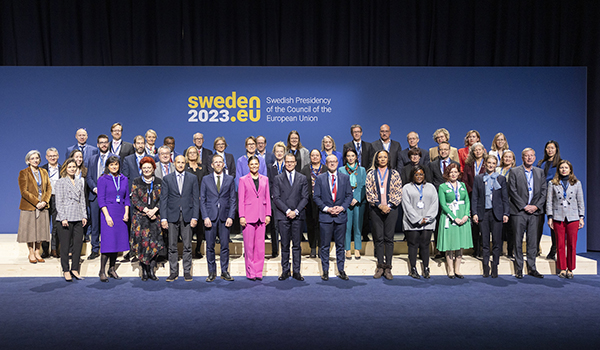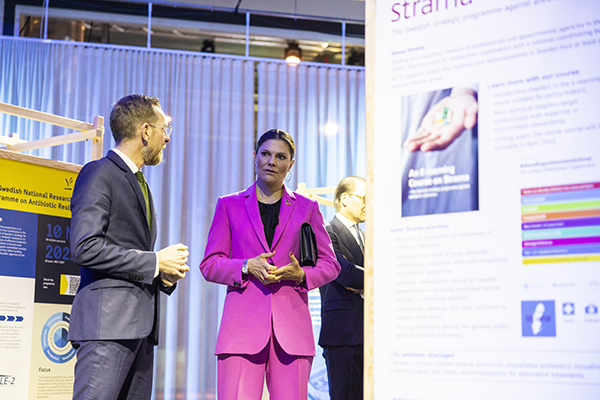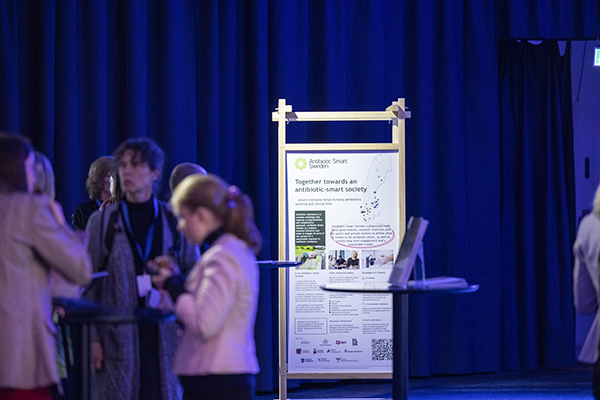2023-03-14
On the 6-7 March, the Swedish EU presidency hosted a high-level meeting on antimicrobial resistance (AMR) in Stockholm. Experts and policymakers from the European commission and the EU’s member states discussed the challenge in antibiotic research and development and how the EU can support global efforts to address AMR more effectively.

More than 140 high-level European and international delegates joined the meeting, which was opened with key note speeches from Her Royal Highness Crown Princess Victoria, Jakob Forssmed, Minister for Social Affairs and Public Health, Stella Kyriakides, Commissioner for Health, Sophie Løhde, the Danish Minister for Health, and Dr Hans Kluge, Food Safety and WHO Regional Director for Europe.

Expert meeting on Research and Development
Preceding the High-level meeting, an expert session with the title “Sustainable access to existing – and stimulation of development of new antibiotics” was held for EU member state experts. ReAct supported the Swedish Ministry of Health in the organisation of this, and participated in the discussions, where details of an end-to-end approach to antibiotic Research & Development (R&D) and access was discussed including what elements of such an approach could be done at EU level. The outcomes where captured and shared during the second day as introduction to the high-level panel on antibiotic research and development.
High level meeting panels

On the second day ReAct’s Founder and Senior Advisor, Professor Otto Cars, was invited to give an introductory speech to the first high-level panel discussing the EU’s global role in addressing antimicrobial resistance. In his speech Otto Cars provided the panelists with his vision for how the 2024 UN High Level Meeting on AMR could be a milestone in the global response to antibiotic resistance.
On the panel was:
- Dr. Hans Kluge, WHO Regional Director for Europe
- Dr. Chris Fearne, Deputy Prime Minister and Minister for Health, Malta, Vice Chair One Health Global Leaders Group on AMR
- Dr. Ahmed Ogwell Ouma, Acting Director, Africa Centers for Disease Control and Prevention (Africa CDC)
- Marjolijn Sonnema, Vice Minister, Director General for Public Health at Ministry of Health, Welfare and Sports, Netherlands.
- Dr. Maria Jesus Lamas Díaz, Executive Director, Spanish Agency for Medicines and Medical Devices, Spain

Professor Otto Cars says:
“This meeting stood out for me because so many participants expressed concern that we are truly running out of time. The sense of urgency in the room was tangible. I left the meeting feeling that political prioritisation of antibiotic resistance is growing quickly now, and that global financing for sustainable access to effective antibiotics – including for implementation of National Action plans – may in fact be underway.”
The second high-level panel focused on antibiotic Research & Development and was introduced by Dr. Malin Grape, AMR Ambassador for Sweden, who reported back on the outcomes from the expert meeting the day before.
On this panel was:
- Jacob Forssmed, Swedish Minister of Health
- Sandra Gallina, Director General, Health and Food Safety (DG SANTE)
- Dr. Ahmed Ogwell Ouma, Acting Director, Africa Centers for Disease Control and Prevention (Africa CDC) and
- Dr. Hans Kluge, WHO Regional Director for Europe
The discussions covered the European Commission’s proposal for a transferable exclusivity voucher for antibiotic R&D, other types of push and pull incentives incl. milestone prizes, the role of HERA in antibiotic Research & Development, local productions including in Africa, as well as the need for new diagnostic tools.

Helle Aagaard, Deputy Director ReAct Europe, says:
“It was encouraging to see experts and policy makers discuss how the EU can take an end-to-end approach to antibiotic Research & Development, and how the goal of sustainable access to effective antibiotics was placed at the core of these discussions. Going forward it is important that this discussion continues and ensure that the sense of urgency does not lead to half-baked and ineffective solutions such as the voucher“.
ReAct participated in the meeting-exhibition
During the meeting days the meeting delegates could also visit an exhibition with posters and digital screens showing examples of work done in Sweden to address antibiotic resistance. The following two projects where ReAct is involved were amongst the projects displayed:
1. The Swedish STRAMA model for healthcare professionals

Her Royal Highness-Crown Princess Victoria and Jakob Forssmed Minister for Social Affairs and Public Health, Sweden, discussing in front of the STRAMA poster at the exhibition of the EU high-level meeting on AMR. Photo: Johannes Frandsen, Government Offices Sweden.
The Swedish STRAMA model was initiated in 2011 as a model to further integrate work to prevent antibiotic resistance into the Swedish health care regions’ core activities. The model has created a national structure for knowledge-based care, exchange of experience and learning for health care professionals. STRAMA will release an app in English beginning May to make the experiences and learnings from this program more widely available.
2. Antibiotic Smart Sweden

Antibiotic Smart Sweden is an initiative that promotes the understanding of antibiotic resistance as a public health issue that is relevant to the whole of society. Through setting up, and encouraging the use of, benchmarks in different sectors, the project demonstrates how different parts of society can be made ‘antibiotic smart’.
ReAct also contributed to the exhibition via the digital screens with the movie Antibiotic resistance – the silent tsunami and the ReAct report “Achieving sustainable access to effective antibiotics for everyone, everywhere”.
Look at video:
More from "2023"
- New ReAct Brief: Antibiotic resistance is one of the greatest & most urgent cross-border health crises of our time – but still not addressed as such!
- 3 questions to MSF: Antimicrobial resistance in the ongoing Gaza war
- ReAct reports from the first AMR Multi-stakeholder Partnership Platform Plenary Assembly
- Workshop on community engagement on antibiotic resistance
- ReAct Asia Pacific: Youth engagement in India
- ReAct highlights World AMR Awareness Week 2023
- Latin America Empowered Communities: One Health meeting with diverse and hopeful voices
- Zambia: March for treatable infections during World AMR Awareness Week
- Release ReAct Africa Conference Report
- ReAct activities for World AMR Awareness Week 2023
- Join React Latin America Empowered Communities Meeting Series in November!
- Join ReAct webinar! AMR High-level Meeting 2024: Mobilizing Collective Action
- ReAct Report: Unlocking Barriers for Collective Action
- 5 reasons why the European Transferable Exclusivity Voucher proposal should go in the bin
- Alforja Educativa launched in Brazil!
- ReAct Asia Pacific: Engaging youth on AMR
- Antibiotic smart students and Teachers
- Key takeaways from the ReAct Africa & South Centre Conference 2023
- ART, BACTERIA AND THE MICROBIOME – A book launch in Ecuador
- Community engagement series – education and advocacy materials!
- Student Kyembe Ignitius Salachi
- ReAct is hiring! Are you our new Director for ReAct Asia Pacific?
- Strengthening Diagnostics Capacity: How can the newly adopted resolution help to contain the spread of antibiotic resistance?
- Almedalen 2023
- Join international dialogue on Art, Microbes and Planetary Health!
- Key achievements on antibiotic resistance during the Swedish EU Council Presidency
- ReAct Africa Conference 2023
- 3 reason why a new Pandemic Accord should address antibiotic resistance
- ReAct’s Impact Report 2019-2022!
- Ambitious new AMR recommendations adopted by EU Member States today
- 33rd ECCMID – ReAct’s highlights and impressions
- Uppsala Dialogue meeting: Experts from more than 20 countries gathered for collaborative actions on ABR
- ReAct Asia Pacific: Sensitizing civil society in India
- Sweden: International high-level meeting – unlocking barriers for collective action on antibiotic resistance
- Sweden’s successful approach to antibiotic resistance can be used as inspiration in other countries
- When Doctor Rianto suffered from antibiotic resistance as a patient
- ReAct Latin America: Cycling as community engagement
- Statement by ReAct – in response to the EC adoption of the revised pharmaceutical legislation proposal
- Mitigating AMR using implementation research: a development funder’s approach
- High-level conference in Japan: Universal Health Coverage, pandemic prevention, preparedness & response and AMR in focus
- New UNEP report – spotlight on environment and AMR
- New publication! Equitable access to antibiotics: A core element for pandemic preparedness and response
- Sustainable access to effective antibiotics in focus at Swedish EU presidency High-level meeting
- New ReAct Expert Policy Brief: 5 key challenges and public not-for-profit solutions in early stages antibiotics R&D
- Time is ticking – more needs to be done to tackle antibiotic resistance
- Sweden: Towards an antibiotic smart society
- Lancet article: Transferable exclusivity voucher: A flawed incentive to stimulate antibiotic innovation
- Lancet article: An analysis of existing national action plans for antimicrobial resistance – gaps and opportunities in strategies optimising antibiotic use in human populations
- New experts in the ReAct Toolbox Advisory Group!
- Dancing with bacteria: a theatrical performance about antibiotic resistance
- Malin Grape – Sweden’s AMR Ambassador on her role and the Swedish EU Presidency
- Genomic analysis of sewage from 101 countries reveals global landscape of antimicrobial resistance
- Dr. Jaya Ranjalkar new Director ReAct Asia Pacific
